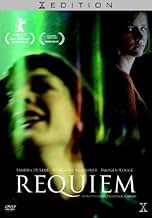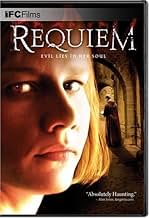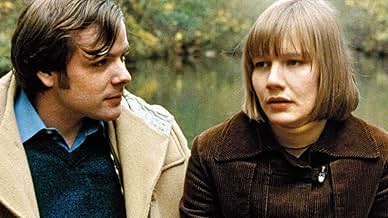VALUTAZIONE IMDb
6,8/10
6623
LA TUA VALUTAZIONE
Aggiungi una trama nella tua linguaA young woman with epilepsy suffers a breakdown during her first year at university, then decides to seek help from a priest in battling the troubles associated with her strict upbringing.A young woman with epilepsy suffers a breakdown during her first year at university, then decides to seek help from a priest in battling the troubles associated with her strict upbringing.A young woman with epilepsy suffers a breakdown during her first year at university, then decides to seek help from a priest in battling the troubles associated with her strict upbringing.
- Premi
- 16 vittorie e 19 candidature totali
Recensioni in evidenza
I've seen both The Exorcism of Emily Rose and this one and found Requiem to be far better and realistic than the other. Emily Rose, in my opinion, was supposed to be commercial Hollywood film. It lulled me to sleep whereas Requiem kept me interested during its entirety. The chief reason for this being the phenomenal performance by the lead actress.
The direction of the film is great as well, since it clearly allows the viewers to form their own decision whether the girl is possessed or schizophrenic. Viewers make their decisions based on which side of the faith they lie. It runs a bit slow but is an excellent psycho-drama devoid of any gratuitous scary scenes.
So overall, in case you like scary stuff, watch Emily Rose; which is not such a great scary movie either. However, if you like psychological dramas and do not wish to watch movies that make you jump out of your seat, watch this one.
The direction of the film is great as well, since it clearly allows the viewers to form their own decision whether the girl is possessed or schizophrenic. Viewers make their decisions based on which side of the faith they lie. It runs a bit slow but is an excellent psycho-drama devoid of any gratuitous scary scenes.
So overall, in case you like scary stuff, watch Emily Rose; which is not such a great scary movie either. However, if you like psychological dramas and do not wish to watch movies that make you jump out of your seat, watch this one.
Requiem works for many reasons--an intelligent script, understated direction, a somewhat verite camera style--but most of all it works because of Sandra Huller. For all of Michaela's exceptionalism, at no point could I doubt this character. As a recovering Catholic myself, I'm sensitive to the role religion, especially Catholicism, plays in people's lives; and Huller, in my opinion, creates the real thing: implicit faith that needs neither to advertise nor to apologize. Michaela's faith isn't about doctrine or rules but the meaning of life--more specifically, about living the meaning of one's own life, including its less attractive implications. Her faith makes her vulnerable to the devil (or, if you prefer, to her imagination that the devil is messing with her), but her faith also endows her growing suffering (and her eventual death, which she clearly foresees; note her reference to "martyrdom" in one of the last scenes) with an abundance of the same meaning that has sustained her life. She is peaceful at the end ("I must walk my path to the end.") That may be hard for a non-religious person to understand, but to someone raised on stories of the great saints, as Michaela was, it makes perfect sense. It is even something to be grateful for.
Requiem pulls off a bit of cinematic legerdemain in making Michaela a relatively open, non-fanatical, non-prudish woman in spite of the depth of her faith. Her real-life original, Anneliese Michel, wasn't much like that. She was a very conservative Catholic deeply opposed to the liberalization then occurring in the Catholic church after the Vatican Council. Her death and the subsequent trial of her parents and the exorcists forced a kind of confrontation, at least in Germany, between Catholic traditionalism, which has an entirely literal belief in spiritual realities and regards demonic possession and exorcism as established facts, and ecclesiastical modernism, which is embarrassed by such medieval notions and therefore preferred to take the position that Michel was "merely" mentally disturbed. (And if she were, did she suffer any the less? Was her faith any less meaningful to her?) Traditionalists regard Michel, her parents, and the exorcists as martyrs to a modernist church disloyal to its Christian past, and Michel's grave is today a pilgrimage site primarily for conservative Catholics. You'd never guess any of this from Requiem's very sympathetic treatment of her story.
Requiem pulls off a bit of cinematic legerdemain in making Michaela a relatively open, non-fanatical, non-prudish woman in spite of the depth of her faith. Her real-life original, Anneliese Michel, wasn't much like that. She was a very conservative Catholic deeply opposed to the liberalization then occurring in the Catholic church after the Vatican Council. Her death and the subsequent trial of her parents and the exorcists forced a kind of confrontation, at least in Germany, between Catholic traditionalism, which has an entirely literal belief in spiritual realities and regards demonic possession and exorcism as established facts, and ecclesiastical modernism, which is embarrassed by such medieval notions and therefore preferred to take the position that Michel was "merely" mentally disturbed. (And if she were, did she suffer any the less? Was her faith any less meaningful to her?) Traditionalists regard Michel, her parents, and the exorcists as martyrs to a modernist church disloyal to its Christian past, and Michel's grave is today a pilgrimage site primarily for conservative Catholics. You'd never guess any of this from Requiem's very sympathetic treatment of her story.
Requiem (2006)
When a positive, well-meaning, troubled young woman meets an ungodly end at the hands of religious zealots, it matters that it is based on fact. So when you see what is going on here to this girl, leaving for college and struggling with some kind of mental disorder, you not only feel for the character. You are astonished about a culture that still has room for this.
The portrayal of mental illness has transformed enormously in the history of movies partly because psychology has changed, too, from Freud and Jung to now. Even looking at the last few minutes of "Psycho" (which everyone conveniently forgets), you see that arch confidence and inaccuracy of mid-century psychology. And now, in 2011, we know how to treat epilepsy (the purported disorder of the main character) and even schizophrenia (likely an additional problem judging by the symptoms) with some level of control.
But this movie is set between the two, around 1971, and so with hindsight we are shocked and frustrated by the people around our main character showing either a "get over it" attitude of a more deadly "god will intervene" kind of attitude. Neither was a good thing.
And yet this woman, played with unusual conviction and brilliant by Sandra Huller, is all about trying to survive. Because of her upbringing she interprets some events as God rejecting her (she can't reach her rosary beads during one epileptic fit), and of course this leads to priests, and to the priests thinking they know how to possibly cure the poor girl. Eventually real life exorcisms are performed, and in a weird synchronicity, a real-world version of the 1973 American film, "The Exorcist."
This one is German, and instead of making everything strange, it makes everything universal. We sometimes think of religious extremism as an American trait, but in fact it is everywhere. This version gives it a Roman Catholic overtone and yet grounds in the the real world, where priests are rather ordinary folk. not mythic brooding types (though the younger priest here is, vaguely, a German Damien). The original "The Exorcist" it turns out was based on a German Lutheran (not Catholic) boy, yet another small echo of one movie to the other.
The comparisons can go too far, for sure. This is a modern movie in what is one thread of contemporary European filmmaking--understated, realist, tautly filmed, issue based movies, many of them from Denmark or Germany. It's a great complement to what is being made here (in the U.S.), with a different flair for dialog and sometimes a more elaborate production sense. This is not small budget but it is straight ahead and almost bare bones in its approach, thoughtfully made and edited. And pertinent now in the sense that fanaticism in any form is to be questioned before it's too late.
When a positive, well-meaning, troubled young woman meets an ungodly end at the hands of religious zealots, it matters that it is based on fact. So when you see what is going on here to this girl, leaving for college and struggling with some kind of mental disorder, you not only feel for the character. You are astonished about a culture that still has room for this.
The portrayal of mental illness has transformed enormously in the history of movies partly because psychology has changed, too, from Freud and Jung to now. Even looking at the last few minutes of "Psycho" (which everyone conveniently forgets), you see that arch confidence and inaccuracy of mid-century psychology. And now, in 2011, we know how to treat epilepsy (the purported disorder of the main character) and even schizophrenia (likely an additional problem judging by the symptoms) with some level of control.
But this movie is set between the two, around 1971, and so with hindsight we are shocked and frustrated by the people around our main character showing either a "get over it" attitude of a more deadly "god will intervene" kind of attitude. Neither was a good thing.
And yet this woman, played with unusual conviction and brilliant by Sandra Huller, is all about trying to survive. Because of her upbringing she interprets some events as God rejecting her (she can't reach her rosary beads during one epileptic fit), and of course this leads to priests, and to the priests thinking they know how to possibly cure the poor girl. Eventually real life exorcisms are performed, and in a weird synchronicity, a real-world version of the 1973 American film, "The Exorcist."
This one is German, and instead of making everything strange, it makes everything universal. We sometimes think of religious extremism as an American trait, but in fact it is everywhere. This version gives it a Roman Catholic overtone and yet grounds in the the real world, where priests are rather ordinary folk. not mythic brooding types (though the younger priest here is, vaguely, a German Damien). The original "The Exorcist" it turns out was based on a German Lutheran (not Catholic) boy, yet another small echo of one movie to the other.
The comparisons can go too far, for sure. This is a modern movie in what is one thread of contemporary European filmmaking--understated, realist, tautly filmed, issue based movies, many of them from Denmark or Germany. It's a great complement to what is being made here (in the U.S.), with a different flair for dialog and sometimes a more elaborate production sense. This is not small budget but it is straight ahead and almost bare bones in its approach, thoughtfully made and edited. And pertinent now in the sense that fanaticism in any form is to be questioned before it's too late.
Top notch performance by Sandra Huller, who thoroughly deserved the Silver Bear for the best actress in this film at the Berlin Film Festival. A very good film on epilepsy and mental illness, not possession by the evil spirits. Ms Huller has been consistently performing well in the films,such as "In the Aisles" and "Toni Erdmann."
Phew this is hard to put into words.
At first I thought the cinematography was stunning, beautifully shot and the period was captured perfectly - I felt like I was watching a film shot in 1972 and it brought back early memories of the 70s.
The script was wonderfully subtle, there was absolutely no judgements about the characters. It would have been very easy to show the mother as a cruel an twisted woman but instead you could empathise with her, she thought she was doing the best for her daughter and that made the whole thing more tragic but also more real and beautiful.
To me the central message of the film was that life, however short is something to celebrate. The girl makes references to St Katarina who only lived a short time but did many wonderful things. She may not have escaped her strict and cruel mother for long but at least she did it and had a wonderful time for a while.
I kept having to tell myself they were actors. The depiction of the girl's first kiss at college was unlike any other I've seen. They captured the clumsiness and true feeling of the situation perfectly.
And finally the soundtrack - you'd think that deep purple wrote 'Anthem' for this film. Earlier we see her dancing ecstatically to the track when she's finally free at college and then we later see the relevance when it's used to play out at the end of the film.
I'm not sure I'll ever see a better film that this and I recommend it to anyone who occasionally likes to be moved by a movie.
At first I thought the cinematography was stunning, beautifully shot and the period was captured perfectly - I felt like I was watching a film shot in 1972 and it brought back early memories of the 70s.
The script was wonderfully subtle, there was absolutely no judgements about the characters. It would have been very easy to show the mother as a cruel an twisted woman but instead you could empathise with her, she thought she was doing the best for her daughter and that made the whole thing more tragic but also more real and beautiful.
To me the central message of the film was that life, however short is something to celebrate. The girl makes references to St Katarina who only lived a short time but did many wonderful things. She may not have escaped her strict and cruel mother for long but at least she did it and had a wonderful time for a while.
I kept having to tell myself they were actors. The depiction of the girl's first kiss at college was unlike any other I've seen. They captured the clumsiness and true feeling of the situation perfectly.
And finally the soundtrack - you'd think that deep purple wrote 'Anthem' for this film. Earlier we see her dancing ecstatically to the track when she's finally free at college and then we later see the relevance when it's used to play out at the end of the film.
I'm not sure I'll ever see a better film that this and I recommend it to anyone who occasionally likes to be moved by a movie.
Lo sapevi?
- QuizSandra Hüller's feature film debut.
- ConnessioniFeatured in The Making of 'Requiem' (2006)
- Colonne sonoreDown 'n' Out
Performed by Light of Darkness
Written by J. Latimer, B. Grant, M. Reoch and M. Bebert
Courtesy of MOP-Musikverlag Hans Sikorski KG
With kind permission of Second Battle Records
I più visti
Accedi per valutare e creare un elenco di titoli salvati per ottenere consigli personalizzati
- How long is Requiem?Powered by Alexa
Dettagli
- Data di uscita
- Paese di origine
- Sito ufficiale
- Lingua
- Celebre anche come
- Réquiem
- Luoghi delle riprese
- Aziende produttrici
- Vedi altri crediti dell’azienda su IMDbPro
Botteghino
- Lordo Stati Uniti e Canada
- 9600 USD
- Fine settimana di apertura Stati Uniti e Canada
- 3309 USD
- 22 ott 2006
- Lordo in tutto il mondo
- 262.460 USD
- Tempo di esecuzione1 ora 33 minuti
- Colore
- Mix di suoni
- Proporzioni
- 2.35 : 1
Contribuisci a questa pagina
Suggerisci una modifica o aggiungi i contenuti mancanti



























